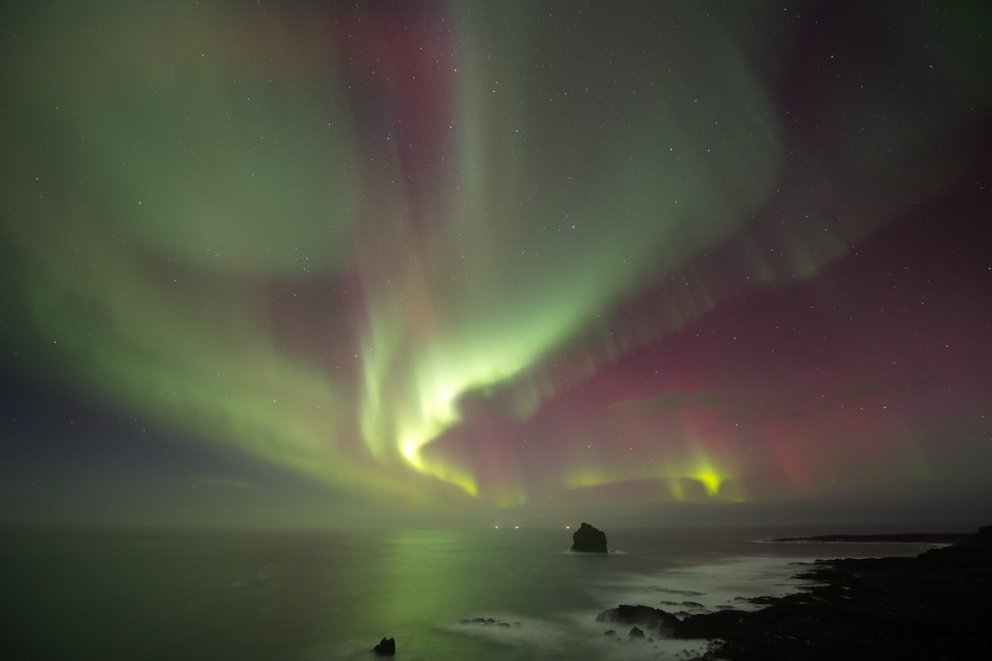What is the best time of year to see the Northern Lights?
Getting your aurora ducks in a row
To see the Northern Lights you’ll need to tick a few boxes. Firstly, you’ll need clear skies. As the aurora borealis is happening high in the earth’s atmosphere, you don’t want anything blocking your view – such as cloud cover. Light pollution is also a problem as you’ll have a much better chance of viewing the aurora against a dark background, so steer clear of anything that’s going to brighten it, like artificial light.
The next factor is strong solar activity. During solar storms, violent explosions called coronal mass ejections occur. Solar flares, where electrically charged particles are thrown out into space, are also common. As these reach the earth’s atmosphere, they react with gases like oxygen and nitrogen and create energy. When the gas molecules calm back down again, the excess energy is emitted in the form of coloured light. That’s what we see as the aurora.
The pros and cons of seeing the Northern Lights in winter
It stands to reason, then, that winter must be a good season for watching the aurora borealis? After all, in places like Iceland that are situated at northerly latitudes, the sun sets early in winter and rises late. In Reykjanes in December you’re looking at days beginning as late as 11am and nights drawing in before 4pm. That surely gives you plenty of hours of darkness to play with.
On a clear night, you do have a chance of seeing the Northern Lights. But there is a big downside and that’s the weather. Winter’s the coldest time of year – no surprises there – and as the aurora can take many hours to show up, or even not at all, you face the prospect of hanging around outside for extended periods of time in the hope of a sighting. Even if you dress warmly, there are probably more fun ways to spend your holiday.
Snow and ice can also impact your aurora hunt. Unexpected – or even forecast – blizzards can temporarily shut roads, making access to the countryside hit and miss. Slippery surfaces can also make it challenging to move around once you’re out of your vehicle; you won’t want to fall, especially if you’re carrying an expensive camera.
Auroras and the equinox
There’s good news, however: you don’t have to visit Iceland in winter to have a chance of seeing the Northern Lights. In fact, deliberately avoiding winter might be a better idea. You see, statistically, the aurora borealis is more often seen around the time of the spring and autumn equinoxes.
In spring, the equinox takes place between March 19th and 21st and the autumn equinox occurs between September 21st and 24th. This is when there is a much greater chance of a geomagnetic storm – precisely what you’re hoping for if you want to catch a glimpse of the aurora.
You shouldn’t find the weather is as cold as in winter, though this is Iceland and anything can happen. Nevertheless, the milder temperatures mean that hanging around waiting for the aurora to show up is much more pleasant. Also, although the days are lengthening, you’ll still have sufficient darkness to make a sighting possible even if you might have to stay awake a bit longer.
Why can’t we see the Northern Lights in summer?
If you experience really strong solar activity, the colours of the aurora borealis can appear much more intense and be seen much further south. In May 2024, for instance, a rare event meant that the Northern Lights were visible from a whole host of places that almost never see them.
The Northern Lights aren’t a seasonal activity. Yet the later in the season you get, the harder it is to witness the aurora. That’s because when it’s bright, the colours are pretty much imperceptible as there’s just too much light. Come to Iceland in June, and you’ll have a different experience – the Midnight Sun.
Solar activity is still taking place, however, and by the second half of August, if the skies are clear enough, you might get lucky. In a region like Reykjanes, there are plenty of places where you can escape light pollution, so if the aurora forecast looks good, take an afternoon nap and prepare to be nocturnal, just in case.

